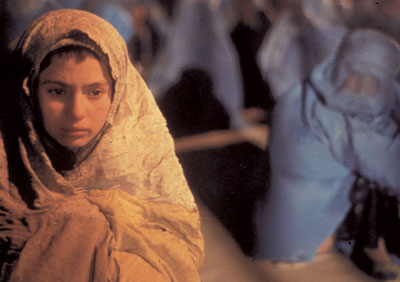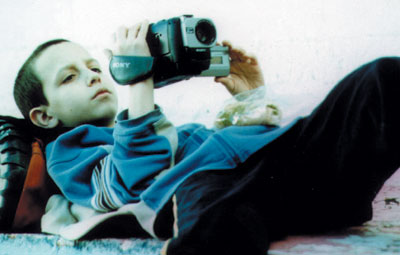WORLD CINEMA: POLITICS AS USUAL?
Noah Cowan on this winter's foreign releases.
 |
| Siddiq Barmak's Osama. |
For such a powerful medium, cinema is frustratingly slow to catch up with the issues of the day. And foreign-language cinema in the U.S. bears a heavier burden still. Typically, many months — or even years — pass between these films’ festival premieres and their American releases. As a result, when we seek the opinions of international artists about the frightening and rapidly changing times we live in, their films — because of this built-in lag-time — frequently fail to live up to our expectations.
There’s one big exception in theaters now, but, ironically, it was made almost 40 years ago. The Battle of Algiers is a morally ambiguous and wholly unnerving portrait of the violent events that precipitated Algerian independence. The protagonists are a group of self-proclaimed and often sympathetic terrorists on one side, and a ruthless yet oddly ethical general from France on the other. As Algiers gradually sinks into the chaos and mayhem of terrorist action and military reprisal, we are subjected to the tit-for-tat atrocities meant to scare the two sides into, alternately, flight and submission. Gillo Pontecorvo’s humanist masterpiece is a cautionary tale about unleashing the dogs of war and underestimating a nation’s pride. No wonder the secret leaked out some months ago that top Pentagon officials had screened the film during the early days of the so-called War in Iraq. Rialto Pictures is rereleasing the film nationwide throughout the winter.
Osama, an arty little film released by the quite big United Artists, also finds dramatic purchase in recent events. The film chronicles the attempt of a little girl in Afghanistan to help her starving family of widowed matriarchs survive by pretending to be a boy (renamed “Osama”!). The ruse functions reasonably well as she works in a friend’s shop — lovely scenes of her learning to pray like a man frame this episode — but things turn frightening as she is recruited into the Taliban child army. Director Siddiq Barmak fully adopts an old-fashioned neorealist style, ignoring the familiar comedic and intellectual amplifications of the form found in the contemporary films of Afghanistan’s neighbor Iran.
Osama’s theme of women in Afghanistan is awfully fashionable right now (see also Samira Makhmalbaf’s newest film, At Five in the Afternoon, to be released sometime in 2004). At the time this film was made, the liberation of women in that blighted country represented a self-justifying moral cloak for people squeamish about the vengefulness of the U.S. actions immediately after September 11. In retrospect, the rights of women in the Middle East have been co-opted by the Bush administration as another piece of its vile moral crusade against Islam and so, despite the film’s absolutely affecting style and courageous performances, there is something assonant about its underlying message.
Subtler, more local forms of political discourse can be found in Iranian darling Jafar Panahi’s newest film, Crimson Gold, and Chinese director Li Yang’s excellent Blind Shaft. Crimson Gold, released by Wellspring, concerns a man who turns to thievery once his middle-class aspirations — purchasing a diamond ring — are thwarted. The strength of the film lies not in its overly familiar subject matter but in a long, surreal middle section in which the man, stopped while delivering pizzas, is forced to watch Tehran police brutally arrest young people as they gradually leave an unauthorized party. The scene neither serves as a motivation for his later actions nor adds to his perceived needs; it floats as a brave witness to fundamentalist, state-dictated moral authoritarianism. And perhaps that’s not so local after all.
Blind Shaft is a tightly wound, perfectly directed study in contemporary ethics. Two miners make their living befriending drifters and then murdering them in newly privatized mineshafts in northeastern China. They then pretend to be family members and negotiate a hefty bribe to shut up about the “accident.” The scam works well until one of them actually grows to like a naive boy-man whose uncle they killed on a previous job. It all rings hideously true, and Li does not allow his otherwise immensely likable characters to shirk their moral responsibility. He distills complex ideas into suspenseful and totally compelling cinema. Kino is distributing.
 |
| Nir Bergman's Broken Wings. Photo: Sharon Bareket. |
One film in which we absolutely expect political content is Nir Bergman’s Broken Wings, Israel’s Oscar submission from 2003. But it doesn’t even refer to Palestinians in passing, focusing instead on the travails of a family unable to recover from the death of a husband and father. The strength of Bergman’s direction, especially his agility with actors and light touch with the material’s inherent melodrama, allows the film to succeed in its own European-style universe. Sony Classics is distributing both this film and another resolutely apolitical work, Monsieur Ibrahim, a glossy French period film about a ghetto relationship between an abandoned Jewish teen and a Turkish shopkeeper known as “the Arab.” Explosive stuff, you might think. Not really. The shopkeeper, played by a most charming Omar Sharif, teaches the boy about the Koran, hookers (the boy sells his family’s books for sex — truly a Woody Allen wet dream) and the value of money. Its evocation of a simpler time is intermittently charming, but one is always waiting for the other shoe to drop. Perhaps Monsieur Ibrahim represents a new genre for our troubled times: the cinema of sociopolitical escape. Parachute, anyone?
VOD CALENDAR


 See the VOD Calendar →
See the VOD Calendar →


